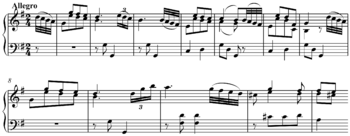- Theme (music)
-
In music, a theme is the material, usually a recognizable melody, upon which part or all of a composition is based. It may be perceivable as a complete musical expression in itself, separate from the work in which it is found (Drabkin 2001). In contrast to an "idea" or "motif", a theme is usually a complete phrase or period (Dunsby 2002). The Encyclopédie Fasquelle (Michel 1958–61) defines a theme as "Any element, motif, or small musical piece that has given rise to some variation becomes thereby a theme."
Contents
Explanation
In classical composition, a principal theme is announced and then a second melody, sometimes called a countertheme or secondary theme, may occur.
A leitmotif is a motif or theme associated with a person, place, or idea. See also figure and cell.
Thematic changes and processes are often structurally important, and theorists such as Rudolph Reti have created analysis from a purely thematic perspective (Reti 1951; Reti 1967). Fred Lerdahl describes thematic relations as "associational" and thus outside his cognitive-based generative theory's scope of analysis (Lerdahl 2001, 5).
Music based on one theme is monothematic while music based on several themes is polythematic. For example, most fugues are monothematic and most pieces in sonata form are polythematic (Randel 2002, 429). When one of the sections in the exposition of a sonata form movement consists of several themes or other material, defined by function and (usually) their tonality, rather than by melodic characteristics alone, the term theme group (or subject group) is sometimes used (Rushton 2001; Benward & Saker 2009, 136).
Fugue
In a three-part fugue, the principal theme (usually called the "subject") is announced three times in three different voices — soprano, alto, bass — or some variation of this.
In a four-part fugue, the principal theme is announced four times. A motif is a short melodic figure used repeatedly which may be used to construct a theme.
Music without themes
Music without themes, or without recognizable, repeating, and developing themes, is called athematic. Examples include the pre-twelve tone or early atonal works of Arnold Schoenberg, Anton Webern, and Alban Berg. Schoenberg once said that, "intoxicated by the enthusiasm of having freed music from the shackles of tonality, I had thought to find further liberty of expression. In fact...I believed that now music could renounce motivic features and remain coherent and comprehensible nevertheless" (Schoenberg 1975,[page needed]).
See also
References
- Benward, Bruce, and Marilyn Nadine Saker (2009). Music in Theory and Practice, eighth edition, vol. 2. Boston: McGraw-Hill. ISBN 978-0-07-310188-0.
- Drabkin, William (2001). "Theme". The New Grove Dictionary of Music and Musicians, second edition, edited by Stanley Sadie and John Tyrrell. London: Macmillan Publishers.
- Dunsby, Jonathan (2002). "Theme". The Oxford Companion to Music, edited by Alison Latham. Oxford: Oxford University Press. ISBN 0198662122
- Lerdahl, Fred (1992)."Cognitive Constraints on Compositional Systems". Contemporary Music Review 6, no. 2:97-121.
- Lerdahl, Fred (2001). Tonal Pitch Space. Oxford and New York: Oxford University Press. ISBN 9780195178296.
- Michel, François (ed). (1958–61). Encyclopédie de la musique, 3 vols. Paris: Fasquelle. (Cited in Nattiez 1990.)
- Nattiez, Jean-Jacques (1990). Music and Discourse: Toward a Semiology of Music, translated by Caroline Abbate [ from Musicologie générale et sémiologie, 1987]. Princeton: Princeton University Press. ISBN 0-691-09136-6 (cloth); ISBN 0-691-02714-5.
- Randel, Don Michael (ed.) (1999). The Harvard Concise Dictionary of Music and Musicians. Cambridge, Mass.: Belknap Press. ISBN 0-674-00978-9.
- Reti, Rudolph (1951). The Thematic Process in Music. London: Faber and Faber; New York: Macmillan Co. Reprinted, London: Faber and Faber, 1961, Westport, CT: Greenwoid Press, 1978. ISBN 0837198755.
- Reti, Rudolph (1967). Thematic Patterns in Sonatas of Beethoven, edited by Deryck Cooke. London: Faber and Faber; New York: Macmillan Co. Reprinted, New York: Da Capo Press, 1992. ISBN 0306797143.
- Rushton, Julia (2001). "Subject Group". New Grove Dictionary of Music and Musicians, second edition, edited by Stanley Sadie and John Tyrrell. London: Macmillan Publishers.
- Schoenberg, Arnold (1975). "My Evolution", in Style and Idea: Selected Writings of Arnold Schoenberg, edited by Leonard Stein, translated by Leo Black, 88. London: Faber and Faber. ISBN 0571097227.
Musical notation and development Staff 
Notes Accidental (Flat · Natural · Sharp) · Dotted note · Grace note · Note value (Beam · Note head · Stem) · Pitch · Rest · Tuplet · Interval · Helmholtz pitch notation · Letter notation · Scientific pitch notation
Articulation Development Coda · Exposition · Harmony · Melody · Motif · Ossia · Recapitulation · Repetition · Rhythm (Beat · Meter · Tempo) · Theme · Tonality · Atonality
Related Categories:- Formal sections in music analysis
Wikimedia Foundation. 2010.

